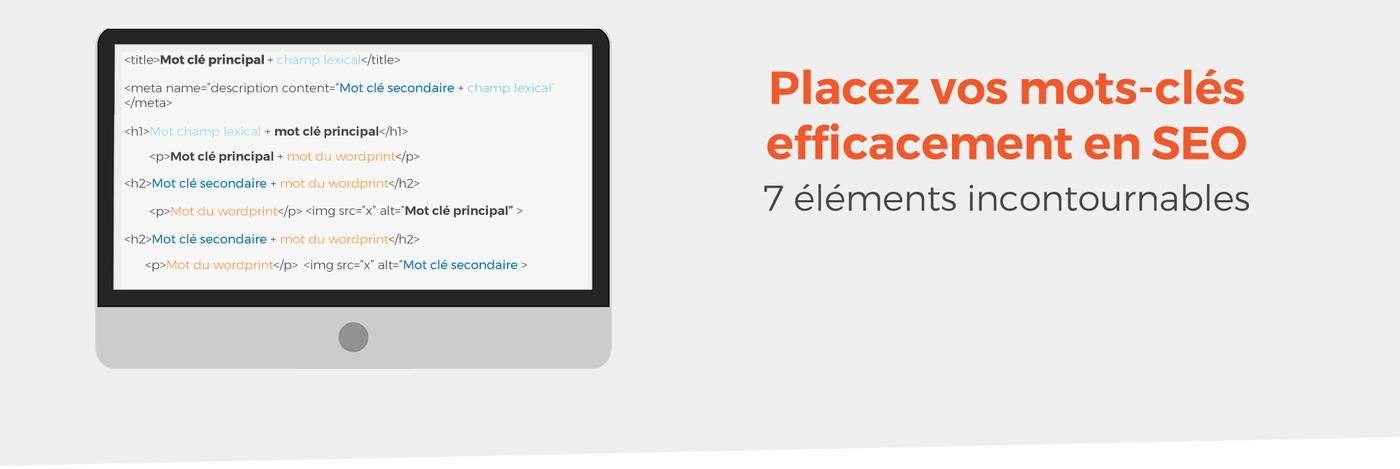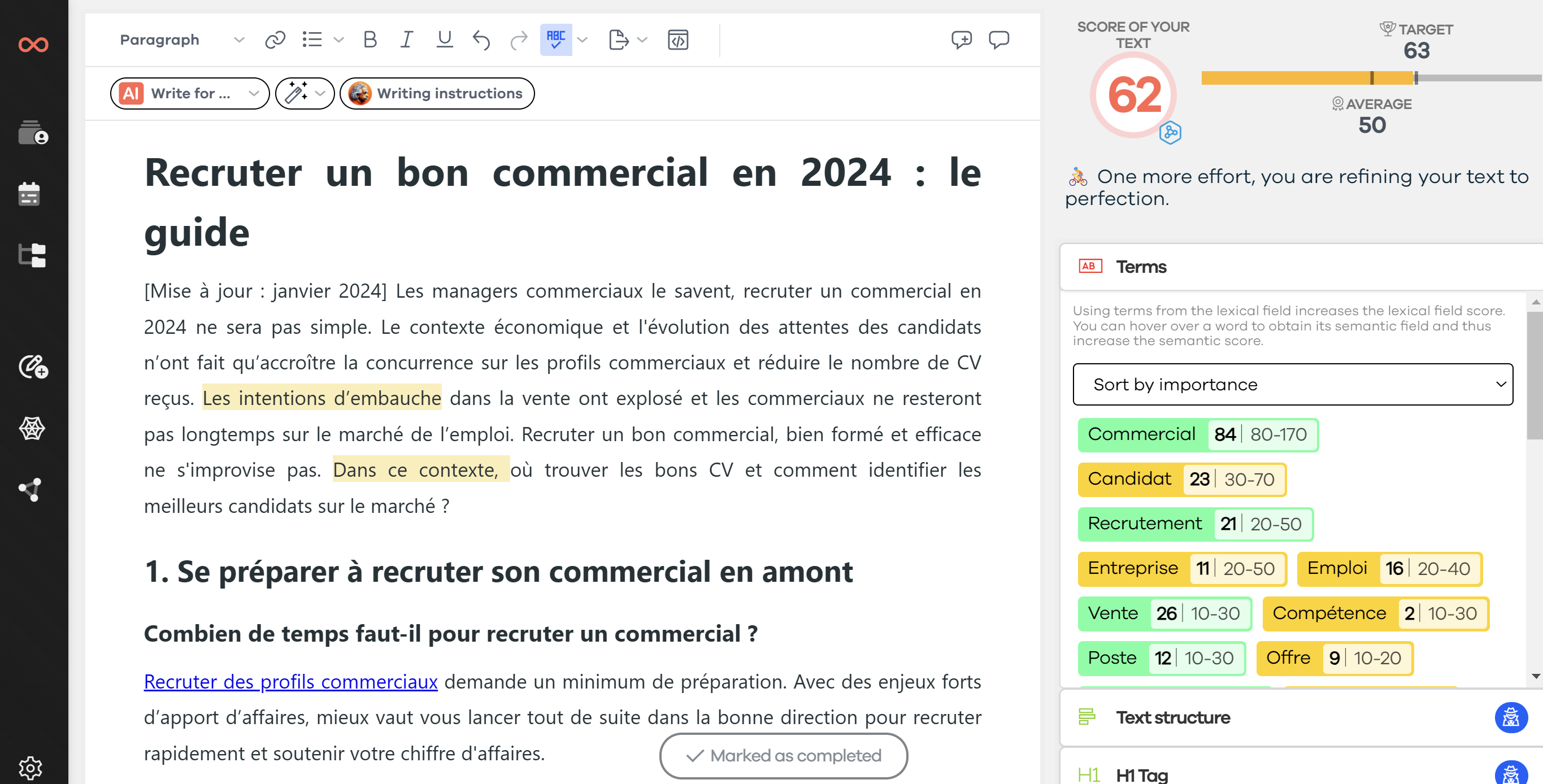If you can't understand the way to use and place keywords for search engine optimization (SEO), you certainly won't get the traffic you want.
Research shows that 95% of internet users only consult the first page of Google search results (SERP). Moreover, half of the clicks on this page go only to the top three results (the golden triangle).
If the use and placement of keywords are incorrect, your website (or your client's) will suffer significantly. And little organic traffic means fewer leads and sales. No business can afford that, right?
In this guide, we will show you how to use keywords correctly for SEO. These placements represent the hotspots in organic SEO. Thus, you will get the traffic, leads, and sales you need.
🚀 Quick read: an infographic to summarize the key points of this article
This infographic alone summarizes the best way to use and place your keywords to boost your organic SEO.
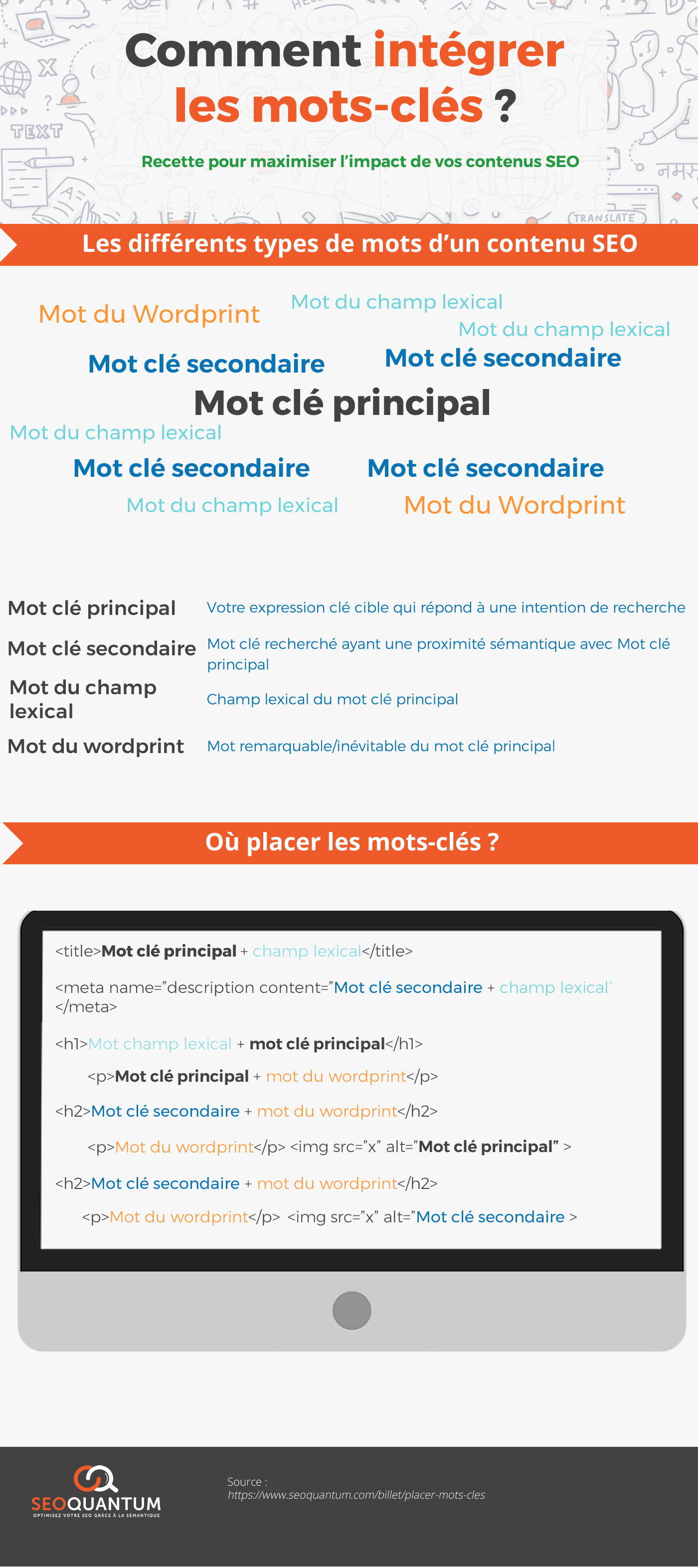
🤑 Understanding the importance of keywords for SEO
Before going any further, let's make sure we're on the same wavelength regarding keywords and organic SEO.
Organic SEO involves optimizing your web pages for better ranking (positioning) on Google's SERP. Part of the SEO process involves using keywords: words and phrases describing what your content is about. Here, we will only talk about "on-site" criteria, i.e., optimization criteria inherent to the website.
Then, Google uses the website's content to determine which page is relevant for a given search phrase. This is what gives a web page its positioning in the SERP.
It's important to note that, although keywords are not the main ranking factor, their use, positioning in the content, and internal links help Google in this process.
Your goal as an SEO specialist: help the search engine understand the subject and expertise of your page for better positioning.
❓ Why and how to use keywords for organic SEO
For using keywords for SEO, the essential starting point is to perform keyword research. This is how you will find the right keywords to include in the first place on a web page.
As we said earlier, using keywords helps Google assign an appropriate position for the site in its results pages.
Keyword research also helps you define your content strategy by creating topics around search terms you know are relevant to your audience.
The best method is to focus on one main keyword per page (never work on multiple pages) and work on a secondary keyword phrase for each element of the same content.
The goal here is not to compete with your own site on Google's SERP (SEO cannibalization phenomenon), so take the time to plan your topics.
In the following section, we will see how to find the SEO keywords to use for your content.
🕵️♀️ How to find keywords for your content?
Start by thinking about the keywords your potential customers might search for. My advice is to start with your personas and indicate for each of them the keywords that concern them.
Then, take your initial list and find the related searches on Google (by scrolling down the search results page). You will find what internet users have also searched for on their side.
You can also use tools for keyword research, such as Semrush or, of course, our automatic content strategy creation tool.
Keyword research is not only useful for creating new content. It is also a major element for improving the organic SEO of existing content. For this purpose, Google Analytics and SEMrush are two useful tools. We will show you how to use them in the next two sections.
🔗 How to find pages to optimize with Google Analytics
Google Analytics will help you find the pages on your site that are already visited by internet users and generate organic traffic. These pages will probably only need a little tweaking to make the content even more visible.
To find these pages, go to Acquisition "All Traffic" Source / Medium. Click on google / organic. You will see your content in a table, sorted by the number of users in the past week. Then add Landing Page as a secondary dimension to display the list sorted by the user's landing page.
Note your first pages in a file or simply export the results.
🔧 How to find pages to optimize with SEMrush
Google Analytics is not your only option for finding pages on which you can optimize SEO-related keywords. You can also use SEMrush.

To do this, log in to the SEMRush website and enter your domain in the search bar, then in the left column Organic Search » Positions. This will show you the main keywords for which your site is already ranked, as well as their position in the SERP.
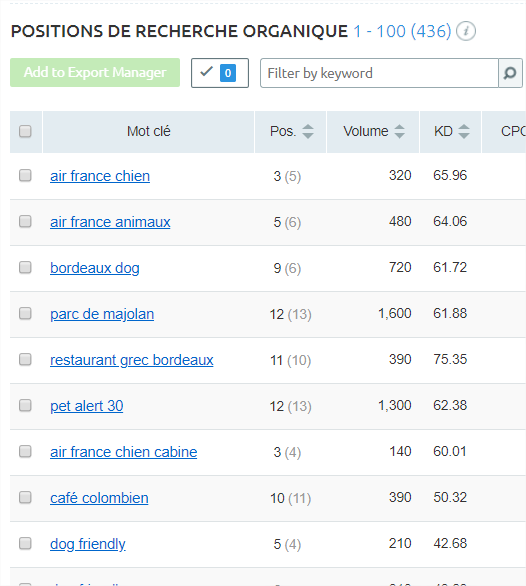
Pay particular attention to the keywords for which your content ranks between 4 and 10. These are good candidates for optimization to get closer to the top 3 more quickly.
Where exactly should you position keywords for organic SEO? We will explain precisely where, why, and how in the following section.
🎯 Where to place keywords for SEO?
Here are the main on-page locations where it is important to use keywords for your SEO.

The title tag
The page title (the title) should express the main subject of your page. It appears as the first line in the search result snippet. This title allows Google and internet users to know exactly what the page is about.
In some cases, the title can be identical to the page name (e.g., "about," "contact us"). However, in other cases, make sure to have a page title (title) always different from the page name (h1 tag).
How to optimize the title tag for organic SEO?
The best method when writing the title tag is to use the target keyword of your page.
1 keyword phrase = 1 search intent = 1 page
Also, consider the position of the keyword in your content. Place it as early as possible in the tag to avoid having your page title cut off in mobile SERPs, which can happen on small screens.
Write a user-friendly title to increase your CTR (click-through rate) on your ad. This is the first element the user sees before landing on your site. Try using this formula to create a catchy title: Numbers + Adjective + Main Keyword + Justification + Promise
To learn more about the title tag, read our guide.
The Meta Description
The next essential element regarding the use of keywords for SEO is in the meta description tag. This can appear as the second line in your snippet on the search results page.
Although the meta description is not used as a ranking criterion, it can help Google determine the relevance of your content based on what users are searching for.
Like the title tag, the meta description motivates users to decide whether they should click on a search result to view the full content of your website. It is essential to use the right keywords here. By "right," we mean relevant to the content that users will find when they click to access it.
Hierarchical headings (H1, H2,…)
Before explaining how to use keywords for SEO in the main content, let's talk about the subheadings of your page: the hierarchical headings. From a technical point of view, subheadings are represented by Hx tags (h1, h2, h3,…).
The primary purpose of hierarchical headings is to structure the text. Subheadings help to scan your content at a glance, thus providing readers' eyes with a place to pause.
Skimming the content can help visitors determine the relevance of the content concerning their search intentions (the keyword they just entered on Google).
How to optimize H2, H3 hierarchical headings?
The best solution is to use the target secondary keywords in at least one of your subheadings.
Content
One of the most important places to optimize the use of keywords is in your content, as it is one of the best SEO ranking factors.
But it is essential to do it right. Misusing keywords can actually harm your search ranking.
For example, it is crucial to avoid keyword stuffing. If keywords appear in every sentence, your content will likely be penalized by Google.
Google provides a concrete example of the kind of mistake to avoid [1]:
"We sell custom cigar boxes. Our custom cigar boxes are handmade. If you are considering buying a custom cigar box, please contact our custom cigar box specialist at custom.cigar.boxes@example.com."
You will agree that content overloaded with keywords is rather difficult to read.
The most effective position of keywords in the content?
Start by using your main keyword in the first two sentences of your content, or at least in the first paragraph. Then, use this keyword and its variations throughout the content.
Semantic optimization of your content
For each keyword phrase you want to exploit, there is a specific lexical field. This is used by Google to identify or not the relevance of your content.
Make sure to use the right lexical field; at SEOQuantum, we call this the Wordprint.
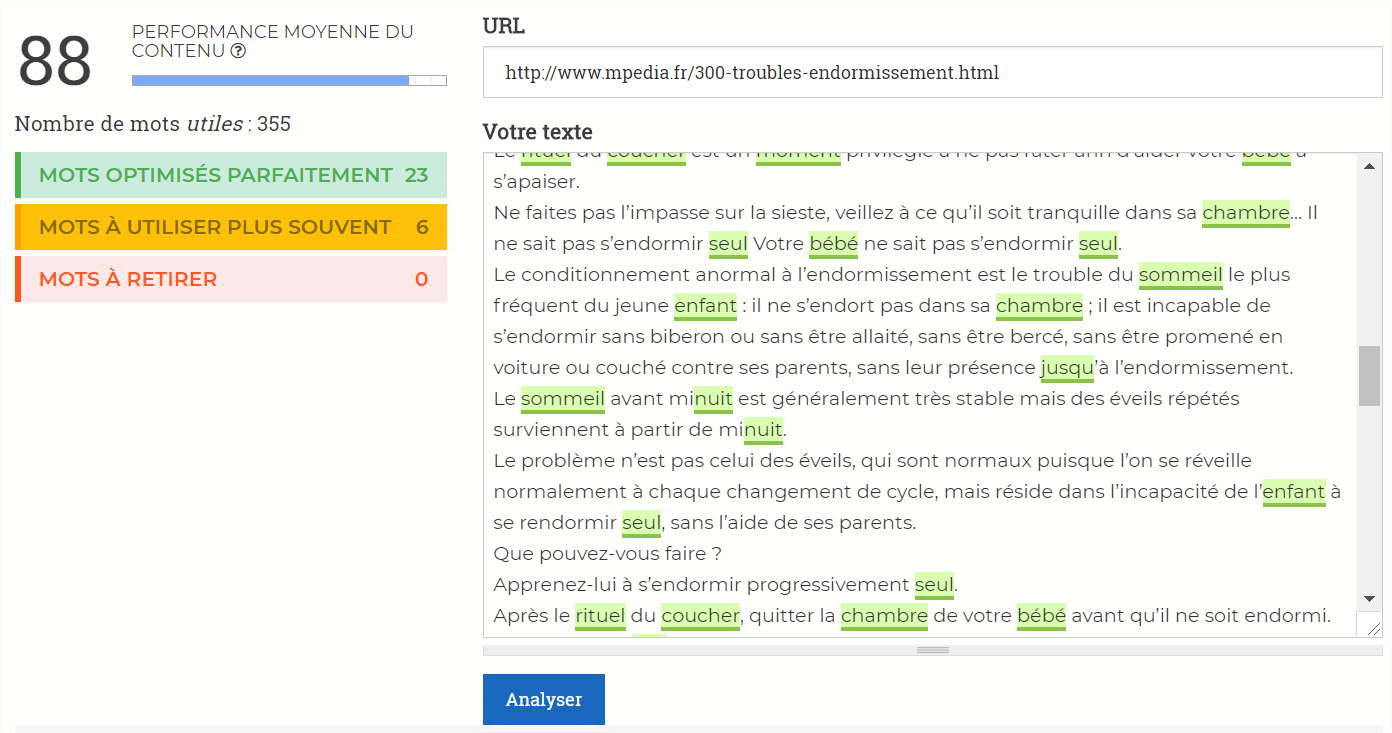
The golden rule for content: write primarily for humans, and make the content readable and understandable.
### Images
When considering using keywords on a website, images are probably not the first elements you think of, but you can't afford to ignore them.
Images are also indexed by Google, creating another way for users to find your site (especially through Google Images).
How and where to use keywords for SEO in images?
1. Make sure the images you use are relevant to your content
2. Give them a file name reflecting this relevance. You can include keywords or secondary keywords here
3. Use SEO keywords in image titles (this is the text that appears when you hover over an image).
4. Use keywords in the alternative text. This is especially the part that contributes to the page's accessibility.
Keep in mind that the best practice for using alternative text with images is to make it descriptive.
### Page URLs
URLs are the web addresses of a page. Have you ever seen URLs that are just strings of numbers and strange characters? These can be a significant obstacle for users, as they mean nothing.
The best URLs give users (and Google) a hint about the content of the page. So you need to make them descriptive. This means you need to replace characters (numbers, letters) with keywords. This is called URL Rewriting.
The best method is to keep URLs short and not include more than one or two keywords to give meaning to the URL for visitors. As before, avoid keyword stuffing!
### Anchor text
Links are one of the three pillars of SEO ranking, so you absolutely need to optimize them for SEO.
The golden rule is as follows: change the anchor text for each new link. The anchor is the clickable text that is highlighted as a link.
If you use the same anchor text for each backlink you create, you will awaken Google Penguin. This is a downgrading penalty aimed at punishing manipulations (bad?) of the search engine. Instead, use secondary keywords or those from the Wordprint to modify the anchor text.
The same rule seems to apply to internal links, which help Google better determine the subject of your page.
Keywords are essential for improving your organic SEO. Use the tools offered in this article to create the ideal keyword list. To achieve this, you can also observe what your competitors are doing on Google. You will certainly find good ideas and may even discover some additional tricks that seem to please search engines.
Once this content strategy is created, think about the ideal position for your main and secondary keywords. Thus, you will prioritize the following areas to increase your organic traffic and improve the click-through rate of your displayed results:
- title tag,
- meta description,
- H1 title,
- first paragraph,
- body of text,
- subheadings (H2, H3, etc.)
- images.
However, remember that you must use varied vocabulary and not be excessive when writing. Google will perfectly understand your content and its main theme. To achieve this, you don't need to repeat the same keyword phrase over and over!
And you, how do you optimize the texts of your web pages? Do you use the same techniques or do you have a secret weapon?
## 🙏 Source used for writing this article
[1] https://support.google.com/webmasters/answer/66358?hl=en
Need to go further?
If you need to delve deeper into the topic, the editorial team recommends the following 5 contents:
